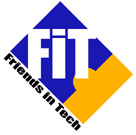
Listen to Computing for the Everyman - Part 5 - Preferences
(Backup Link)Support TechnologyIQ:iTunes Review |
Digg.com |
Podcast Alley | Reader/Listener Line @ 206-338-5832
Transcript: If you remember the theme of this blog and podcast, it has always been to "Control your technology, don't let it control you!" In light of that, today's article is on how to make your computer and your programs act the way you want them to act, not the other way around.
First, every computer, every piece of software and every online service you use will have some preferences that can be altered by you. Sure, there will be default settings that work for the basics, but there can be anywhere from 1 to 100 different options that you can turn off and on, depending on how you want the program or service to operate.
The main reason I am writing on this topic is that nearly everyone I meet, whether friend or client, has some complaint about how their computer or software operates. Microsoft Word is the usual focus of their attacks. It has many features that try to be "friendly" and useful, but usually end up annoying most folks. So, I often find myself telling folks how to turn off this or that feature. The thanks I receive are amazingly heartfelt. After years of suffering under the tyranny of their software, they are free at last.
Now, you might not have such strong feelings about your software, but you can also learn a few things about your computer by checking out the preferences (or Options, as Windows insists on calling them) on your computer.
Let's start with the computer itself. On a computer running Microsoft Windows, the basic settings for Windows are held in the Control Panel. You should see Control Panel listed in your Start Menu, or it might be under Start Menu, Settings, Control Panel. There you will find items that let you change the size and resolution of your screen, network settings, uninstall programs and more. Look around there, and check out each individual Control Panel item. Don't worry, if you think you may have changed something by mistake, press the Cancel button to leave the Control Panel and the settings will remain unchanged.
On an Apple Macintosh computer, your basic preferences are found in the System Preferences application. This is always available from under the blue Apple menu, and it might also be available in your Dock. Just like with Windows, these System Preferences allow you to change the basic settings of your Mac.
Now, each program you use also contains its own preferences that are specific to the tasks that the program performs. Let's take Microsoft Word for example. On a Windows computer, you would select Tools Menu, Options... to see all the settings for the program.
I will admit, the Options page for a program like Word can look intimidating. Not only do you have one page showing 10-30 options, if you look at the top of the Options window, you will see tabs indicating another 10-12 pages of options, divided by category. Clicking on a tab brings that set of options to the front. Clicking OK saves any options you might have changed. Even though you won't have a need to change many of these options, take a moment to familiarize yourself with the options that are available. Then, repeat this for each program you use regularly.
On an Apple Macintosh, you can access preferences for each program by selecting Preferences under the Application menu (This is the menu, next to the blue Apple menu, that is the name of the program you are using. For example, if you are using Microsoft Word, the menu will read "Word".)
The next time your computer or software isn't working the way you wish, try checking out the Preferences and see if there is a way to change its behavior. You can find out more information about each preference by selecting the Help menu in most programs and searching for a particular Preference or operation.
Until next time, "Control your technology, don't let it control you!"
Technorati Tags:
DIY,
howto,
how-to,
tutorial,
technology,
windows,
macintosh,
software,
computers,
high-techLabels: computers, DIY, education, high-tech, how-to, howto, learning, macintosh, preferences, software, technology, tutorial, windows
 TechnologyIQ
TechnologyIQ
 In today's Real World Example, it seems that no matter what anti-virus and anti-spyware you have installed, if you forget to install all your Windows Updates, you can still get a pretty nasty infection.
In today's Real World Example, it seems that no matter what anti-virus and anti-spyware you have installed, if you forget to install all your Windows Updates, you can still get a pretty nasty infection.







